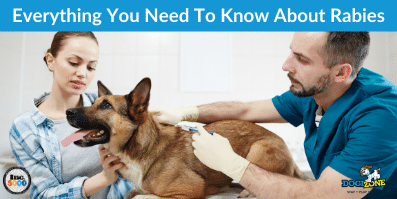Everything You Need To Know About Rabies
It may seem like rabies is no longer an issue in Rockville and throughout Montgomery County, but this is not the case. According to government reporting, there are about 40 animals a year that are tested and verified to have rabies. 
In most cases, the infected animals are not domestic, although there are occasionally cats that test positive. Most cases are bats, foxes, and raccoons, but that does not mean that dogs cannot get rabies if they are not vaccinated and come in direct contact with an infected animal.
Rabies Basics
Rabies is a virus, and it is commonly spread through the direct transfer of saliva from an infected mammal into the bloodstream of another mammal. In very rare cases it can occur if infected saliva gets on a scratch or cut, or if the saliva makes contact with the eyes, the interior of the nose, or the mouth.
Rabies is classified as a zoonotic disease, which means it can pass from animals to humans. However, thanks to vaccines and treatment options, the USA averages only three human deaths per year from the disease.
Once the symptoms of rabies develop, which will be two to eight weeks after a bite from an infected animal, there is no treatment available. Dogs may become aggressive, sensitive to light and touch, and a progression of symptoms, including foaming at the mouth and seizures, will occur before death.
Vaccinations for dogs are effective in not only preventing the dog from having a fatal response to the virus, but it also protects a dog from being able to pass the virus to humans or other pets. At Dogizone, for the health and safety of all dogs in our care, each dog must be up to date to date on rabies vaccinations.
Keep in mind, all dogs in Rockville and throughout the state must be vaccinated for rabies. Vaccination is the law, and fines of $500 are imposed if dogs are not correctly vaccinated.
Prevention Tips
Talk to your vet about vaccinating your dog for rabies. Puppies are vaccinated for rabies at 14 to 18 weeks of age and then again at one year to sixteen months. Every one to three years, depending on the type of vaccine and other factors, your adult dog will also be vaccinated for rabies.
In addition to vaccination, which is the only way to effectively protect your pet, avoiding specific situations can reduce the risk of contact with an infected animal. Keeping your dog on a leash when hiking, visiting a park, or even when going to a rural area is one of the best options.
However, it is important to keep in mind that feral cats and raccoons can be found right in the city of Rockville. Avoid keeping trash bins or any type of food outdoors or in the yard. These items can attract animals and increase the risk your dog may come in contact with an animal with rabies, even in your own backyard.

